 |
 |
|
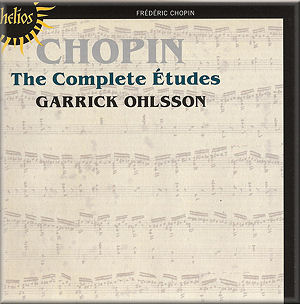

alternatively
CD: AmazonUK
AmazonUS
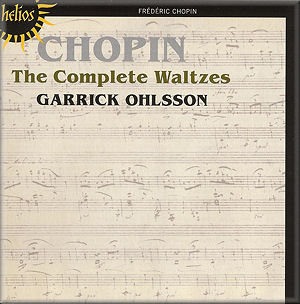

alternatively
CD: AmazonUK
AmazonUS
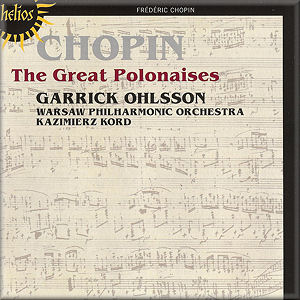

alternatively
CD: AmazonUK
AmazonUS
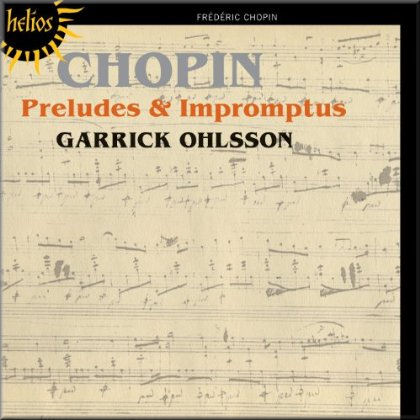

alternatively
CD: AmazonUK
AmazonUS
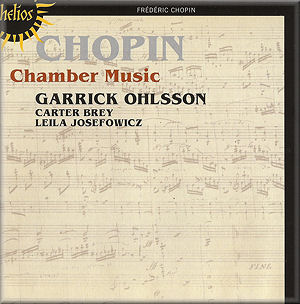

alternatively
CD: AmazonUK
AmazonUS
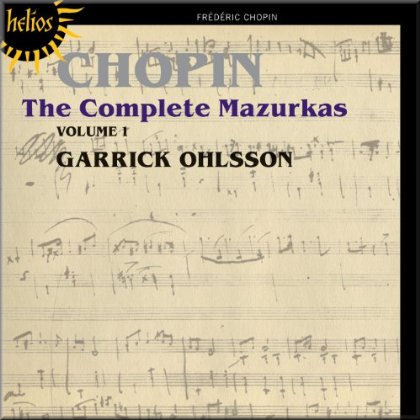

alternatively
CD: AmazonUK
AmazonUS
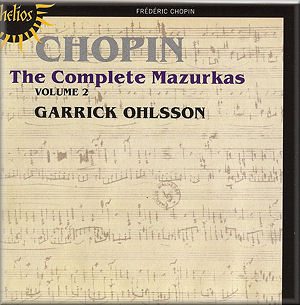

alternatively
CD: AmazonUK
AmazonUS
|
Frédéric CHOPIN (1810-1849)
The complete Études
Full track listing at end of review
 Garrick Ohlsson (piano)
Garrick Ohlsson (piano)
rec. October 1996, Performing Arts Center, Purchase College, State
University of New York.
 HYPERION HELIOS CDH55380 [67:07]
HYPERION HELIOS CDH55380 [67:07] 
The Complete Waltzes
Full track listing at end of review
 Garrick Ohlsson (piano)
Garrick Ohlsson (piano)
rec. 1995, New York.
 HYPERION HELIOS CDH55381 [75:30]
HYPERION HELIOS CDH55381 [75:30] 
The Great Polonaises
Full track listing at end of review
 Garrick Ohlsson (piano)
Garrick Ohlsson (piano)
Warsaw Philharmonic Orchestra/Kazimierz Kord (Op.22)
rec. 1993, New York, and Warsaw 1997 (Op.22).
 HYPERION HELIOS CDH55382 [74:34]
HYPERION HELIOS CDH55382 [74:34] 
Preludes and Impromptus
Full track listing at end of review
 Garrick Ohlsson (piano)
Garrick Ohlsson (piano)
rec. 1989, 1993 and 1995
 HYPERION HELIOS CDH55383 [71:21]
HYPERION HELIOS CDH55383 [71:21] 
Chamber Music
Full track listing at end of review
 Garrick Ohlsson (piano)
Garrick Ohlsson (piano)
Leila Josefowicz (violin Op.8), Carter Brey (cello Op.65,
Op.3, Grand Duo)
rec. New York, 25-28 July 2000
 HYPERION HELIOS CDH55384 [76:13]
HYPERION HELIOS CDH55384 [76:13] 
The Complete Mazurkas Vol.1
Full track listing at end of review
 Garrick Ohlsson (piano)
Garrick Ohlsson (piano)
rec. New York, 1998
 HYPERION HELIOS CDH55391 [71:18]
HYPERION HELIOS CDH55391 [71:18] 
The Complete Mazurkas Vol.2
Full track listing at end of review
 Garrick Ohlsson (piano)
Garrick Ohlsson (piano)
rec. New York, 1998
 HYPERION HELIOS CDH55392 [69:25]
HYPERION HELIOS CDH55392 [69:25] 
|
|
|
We’ve had the original releases on the Arabesque
label, the collected complete works in a remarkable 16
CD box, and now Hyperion have released a selection of Garrick
Ohlsson’s recordings on their Helios budget label. Looking at
the Hyperion website it would appear these seven discs are all
the re-releases so far. There may be others in the pipeline,
though I should imagine the label will want to keep some powder
in reserve, otherwise no-one will want the box set. As things
stand these individual discs come out dearer per disc than as
they appear amongst the complete works, so if you want the complete
Chopin experience then the full set is still an attractive proposition.
Not all of us want everything at once however, and so we can
now cherry-pick some of the choicest piano solo morsels, and
a very fine disc of the chamber music as well.
I’ve been listening to some of Garrick Ohlsson’s recordings
from the 1970s on the EMI 200th Anniversary Edition box, and found his playing in the EMI
set to be amongst the best, though in some works with some considerably
differing interpretations from those we find on the Hyperion
discs, in particular with the Preludes. In general, you
can expect direct, manly performances, full of technical prowess
and a powerful touch which is softened but rarely entirely disguised
by the velvet glove Chopin sometimes demands. I appreciate his
unsentimental approach, but in casting the net wider to pianists
such as Alice Sara Ott on Deutsche Grammophon (DG), realise
there are other ways of tackling these works – with a gentler
touch, but equally without turning them into fluffy and superficial
romances. I’ve dug out my old Rubinstein LPs as well, and while
accepting that his Chopin recordings are something of a reference,
have also to accept that they will never be all things to all
people. Stopping short of the Herculean labour of deciding which
recording of what might be all-time best, I can save everyone
time by confirming that all of these discs are worth having,
and if study or enjoyment is your aim then you could do far
worse than having Garrick Ohlsson as your Chopin guide in the
works presented here.
Ohlsson’s Études disc is an impressive collection, but
for me every recording of these pieces meets almost insurmountable
opposition from Maurizio Pollini on his 1972 DG recording. This
latter disc is a must-have for all Chopin and piano music collectors,
though there are those who would argue that his technical perfection
overrides a certain sterility in the performance. Ohlsson is
very good in all of these pieces, though only just makes it
through the transition before the recapitulation in Op.10
No.1, that particular moment cropping up at 0:59. Supremely
difficult in places, Ohlsson sails through all other technical
problems in these pieces with ease, as well as singing warmly
in those gorgeously expressive melodic lines such as Op.10
No.3 and No.6. I particularly like his touch in the
arpeggiated chords with crowning melody of Op.10 No.11,
and there is also great fun to be had in the bounce of Op.25
No.4 and No.9, and in charmingly irregular
fashion in No.5, reminding me a little of its appearance
on Horowitz’s final recording. The central pieces of both collections
do not disappoint, such as the massively heroic final Op. 10
and Op. 25 études in C minor. The longest of them all; Op.25
No.7 is captivating: just start by listening to the phrasing
of that opening solo line, and you may find you’ve heard the
whole piece in a trance, woken only by that final low coda and
delightfully delayed cadence. Almost in defiance of their unassuming
title, the Études hold some of Chopin’s best music, and
this recording will not disappoint. The three Nouvelles études
are a pleasant bonus, buy don’t add much after the sheer
brilliance of the preceding music.
Having received Alice Sara Ott’s new recording of the Complete
Waltzes on DG it seemed logical enough to compare her approach
with Garrick Ohlsson’s. I came to the conclusion that her approach
sought to present the pieces as Chopin might have played them
himself, or at least would have appreciated hearing them – no
doubt with a few helpful suggestions to add to a very fine recording
indeed. By contrast, Ohlsson’s playing is more that of the concert
hall than the drawing room, projecting all over the place and
delivering a more steely touch. This is a case of swings and
roundabouts, and my Libran nature finds it hard to come down
either way in stating a preference for one over the other. Ohlsson
is more butch, but has his own subtleties of contrast and touch,
and certainly gives more of a feel of these as dances as well
as piano pieces, whipping up a whirling storm wherever possible.
As with the Études he manages to balance that line between
rubatoid romanticism, beauty of touch and directness of musical
message in lovely pieces such as Op.34 No.2. Pieces such
as the famous ‘Minute’ Waltz Op. 64 No.1 and others which
Chopin seems to have written with the intent of hearing the
pianist trip up or the music to roll headlong down a steep hill
such as Op.42 are never overcooked by Ohlsson, and he
precipitates reams of notes with absolute control and impeccable
phrasing, as well as providing considerable excitement at times.
All the old favourites are played with a lovely touch, and this
is a recording which, while perhaps on occasion more of the
forceful and masculine school of Chopin, will live happily amongst
others as one of the best.
‘The Great Polonaises’ disc presents, as its title would suggest,
a selection of Chopin’s best works in this genre, a type of
piece which had developed from a popular rural dance to a form
demanded in aristocratic ballrooms and, as far as Chopin was
concerned, far beyond. The fantastic and sometimes epic material
which Chopin invested in these pieces is played with grand style
by Ohlsson, with fine resonant energy and pregnant pauses in
the Polonaise in E flat minor Op.26 No.2, and noble character
in the famous and patriotic ‘Military’ Op.40 No.1. Impressive
pianism and dignity of a different order appear directly following,
in the more darkly expressive Op.40 No.2, clearly deeply
felt by Ohlsson. Pianist Jeremy Denk in his online blog ‘Think
Denk’ thankfully tuned into my search for the elusive qualities
in the Polonaise-Fantasy in A flat major Op.61 in his
‘Chopin’s for Dummies’ entry, and I am grateful for his pointing
out of numerous vital aspects in a piece which can seem confusing
in its 15 minute or so sprawl. Ohlsson is on top of these crucial
moments, and creates a fascinating and indeed poetic atmosphere
in the work. The orchestral contribution in the final Grande
Polonaise jumps out as a bit of a surprise, but a welcome
one. The piano balance is rather huge in relation to the orchestra,
the softer contributions of the string and horn being rendered
more or less superfluous, but this is still a fine performance
with a piano bass to rattle your porcelain.
The Preludes Op.28 were a point of comparison between
the Ohlsson of the 1970s and that of the late 1980s and 1990s.
His earlier recordings are rather straighter, and there are
some surprising differences of tempi between the two. These
more recent Hyperion recordings are a somewhat richer diet in
terms of expressive flexibility. Again, I initially found myself
unable to chose between the two, preferring the simplicity and
directness of the earlier recordings, bemoaning some of the
added slowness and dragging of such as Op.28 No.4 in
the later version, but appreciating some of the expressive limpidity
and added sense of poetic expression in other pieces. As with
many such things, taken in isolation these are fine performances
on the whole, but the feeling that everything is about to ground
entirely to a halt is too close to the surface in preludes such
as the beautiful Op.28 No.6, whose melody is left abandoned
and bereft of direction over an accompaniment which simply refuses
to get up off its sickbed and walk. In all, Ohlsson seems to
have gone too far in terms of experimental slowness in No.7,
marked Andantino and where time is perhaps intended to
stand still, but in fact the effect of a musical clockwork which
is running its final flagging cycle before giving up the ghost
altogether is closer to the mark. There are many fine things
in this performance, but a few too many eccentricities to make
it a first choice. The Impromptus are nicely done, and
the witty No.2 in F sharp minor Op.36 is a delight.
The ‘Chamber Music’ CD in this series is one of the highlights,
with gorgeous cello sound from Carter Brey in a nicely shaped
Cello Sonata. The stirring themes which crop up in the
Scherzo are powerfully done, and the Largo has
a perfect tempo and weight, the slow conversation between piano
and cello developing inexorably over a forward momentum which
is neither static nor rushed and superficial. This was Chopin’s
last large scale composition, and becomes all the more moving
in this recording if one keeps this in mind. The same instrumental
synergies in performance apply to the Introduction and Polonaise
brillante in C major Op.3, with some delightful piano touches
in the opening flourishes, Carter Brey colouring the arguably
over-long phrases in the melodic line. The independence of parts
in this piece at times foreshadows the even more ambitious Grand
Duo in E major and the two pieces go well together. With
the Piano Trio in G minor Op.8 we get to the real treat
on this disc however, with some cracking chamber-music making
from an ensemble which now adds violinist Leila Josefowicz to
its number. This is a work which has been criticised for its
lack of equality in the parts, and there are indeed swathes
in which the piano has a leading role and the strings act as
a kind of filler. There is much to be enjoyed here however,
and it’s one of those pieces that, once heard in a performance
as fine as this one, holds a kind of spell over the listener,
drawing you back to hear more of this warmly genial and cleanly
appealing music.
Finishing up with the two volumes of the Mazurkas, we
arrive pretty much where we set off. Garrick Ohlsson’s performances
of these wonderful pieces are rarely over-controversial, but
many of his interpretations have a hard-hitting quality which
has the notes ricochet off your walls. I quite like most of
these; Ohlsson combining his pianistic fireworks with some wonderfully
expressive moments of balance and repose. He doesn’t hit us
over the head too hard and too often, and utilises his wide
dynamic range to tease and cajole the little dramas and poetic
corners into our awareness by stealth. There are a few works
where the sense of extreme rubato might seem too mannered, but
I didn’t find myself sliding off the stool in the same way as
with some of the Preludes. In his booklet notes Jeremy
Nicholas mentions the encounter with Chopin and Meyerbeer, in
which the latter composer was convinced Chopin was playing in
2/4 rather than 3/4, so extreme was the composer’s own rubato,
so who am I to complain about Garrick Ohlsson’s performance
style. There are some pure nuggets as well. Op.17 No.3 for
instance, which holds a strange intensity in its minimal means,
Ohlsson’s performance reminding me of something from Janacek’s
‘Overgrown Path’. Op.17 No.4 immediately following is
an example of what you might love or hate about these performances;
the left hand sometimes pushing forward, even giving the impression
of being in front of the melody at times, and restless – not
boringly square by any means, but determined to defy stability
where expressive doodling will do. With Volume 2 we hear Ohlsson
having great fun with the ‘bagpipes’ with Op.56 No.2,
and this set is full of very nice touches. Delicacy is a positive
feature of the later Op.67 and Op.68 sets, Op.68 No.4 being
Chopin’s ‘final inspiration’, the composer too ill even to try
it out on the piano. Ohlsson is sensitive to the gentler characteristics
in these pieces, and the ride here is both vibrantly lively
and poetically restrained.
Given useful booklet and apparently new notes by Jeremy Nicholas,
these budget releases only lack vibrancy in the rather beige
cover presentation. These are fragments of Chopin’s autograph
manuscripts which give the discs a family identity, if not exactly
having them leap out at you from the shelves. With such top
class recordings you certainly won’t be disappointed by the
production values on these discs, and the performances are all
of a very high standard. My minor gripes about tempi and rubato
here and there are subjective opinions, but based on niggles
which I know would disturb me on returning to those particular
recordings. Unreserved recommendations go out for the chamber
music disc, and Ohlsson’s solo work is never less than superbly
played and exquisitely interesting.
Dominy Clements
Full track listings
The complete Études
Études, Op 10 [28:55]
Études, Op 25 [31:38]
Nouvelles études, KKIIb/3 [6:32]
The Complete Waltzes
Waltz in E flat major, Op 18 [5:38]
Waltz in A flat major, Op 34 No 1 [5:54]
Waltz in A minor, Op 34 No 2 [7:00]
Waltz in F major, Op 34 No 3 [2:40]
Waltz in A flat major, Op 42 [4:03]
Waltz in D flat major 'Minute', Op 64 No 1 [1:54]
Waltz in C sharp minor, Op 64 No 2 [4:02]
Waltz in A flat major, Op 64 No 3 [3:15]
Waltz in A flat major, Op 69 No 1 [4:36]
Waltz in B minor, Op 69 No 2 [3:56]
Waltz in G flat major, Op 70 No 1 [2:26]
Waltz in F minor, Op 70 No 2 [3:45]
Waltz in D flat major, Op 70 No 3 [3:07]
Waltz in A flat major, KKIVa/13 [1:46]
Waltz in E major, KKIVa/12 [2:48]
Waltz in E minor, KKIVa/15 [3:04]
Waltz in A minor, KKIVb/11 [2:16]
Sostenuto in E flat major 'Waltz', KKIVb/10 [2:18]
Waltz in E flat major, KKIVa/14 [2:51]
Waltz in F sharp minor 'Valse mélancolique', KKIb/7 [3:37]
Contredanse in G flat major, KKAnh.Ia/4 [2:11]
Ecossaises, Op 72 No 3:
No 1: D major [0:53]
No 2: G major [0:38]
No 3: D flat major [0:42]
The Great Polonaises
Polonaise in C sharp minor, Op 26 No 1 [8:11]
Polonaise in E flat minor, Op 26 No 2 [7:51]
Polonaise in A major, Op 40 No 1 [3:48]
Polonaise in C minor, Op 40 No 2 [8:30]
Polonaise in F sharp minor, Op 44 [10:40]
Polonaise in A flat major, Op 53 [7:00]
Polonaise-Fantasy in A flat major, Op 61 [14:20]
Andante spianato and Grande Polonaise, Op.22 [14:09]
Preludes and Impromptus
Twenty-Four Preludes, Op 28 [41:52]
Prelude in E flat minor Op 28 no.14: Largo [1:08]
Presto con leggierezza 'Prelude in A flat major', KKIVb/7 [0:40]
Prelude in C sharp minor, Op 45 [5:48]
Impromptu No 1 in A flat major, Op 29 [4:21]
Impromptu No 2 in F sharp major, Op 36 [6:21]
Impromptu No 3 in G flat major, Op 51 [5:54]
Fantasy Impromptu in C sharp minor, Op 66 [5:12]
Chamber Music
Cello Sonata in G minor, Op 65 [25:51]
Introduction and Polonaise brillante in C major, Op 3 [9:27]
Grand Duo in E major on themes from Meyerbeer's Robert le Diable,
KKIIb/1 [14:19]
Piano Trio in G minor, Op 8 [26:34]
The Complete Mazurkas Vol. 1
Four Mazurkas, Op 6 [7:56]
Five Mazurkas, Op 7 [9:16]
Four Mazurkas, Op 17 [13:09]
Four Mazurkas, Op 24 [11:31]
Four Mazurkas, Op 30 [9:58]
Four Mazurkas, Op 33 [10:31]
Four Mazurkas, Op 41 [8:57]
The Complete Mazurkas Vol. 2
Three Mazurkas, Op 50 [7:56]
Three Mazurkas, Op 56 [9:16]
Three Mazurkas, Op 59 [13:09]
Three Mazurkas, Op 63 [11:31]
Mazurka in A minor, KKIIb/5 [2:19]
Mazurka in A minor, KKIIb/4 [3:29]
Four Mazurkas, Op 67 [10:31]
Four Mazurkas, Op 68 [8:57]
Mazurka in B flat major, KKIIa/3 [1:07]
Mazurka in G major, KKIIa/2 [1:24]
Mazurka in D major, KKAnh.Ia/1 [1:21]
Mazurka in B flat major, KKIVb/1 [1:08]
Mazurka in C major, KKIVb/3 [2:27]
Mazurka in A flat major, KKIVb/4 [1:17]
|
|




 All Nimbus reviews
All Nimbus reviews








